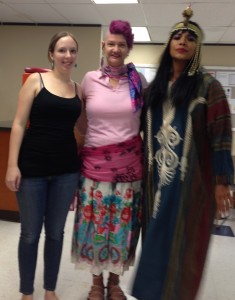For the October 2014 Austin Writers Roulette, “Visionary Ideas,” I imaged myself as the future global leader of the world. Not too far fetched, considering that most of the world’s population is female, brown-skinned and English-speaking (as a first, second or third language). There were ten changes that I wanted to see in the world. Before reading them, I informed the audience that they could applaud after I’d read each one.
Here is my list of demands for the future of this world:
- Women will hold 51% of all leadership positions in government, businesses and religions since we represent 51% of the world’s population.
- Religion will stop being used to justify violence.
- Violence will stop being used to resolve conflicts.
- During conflicts, we will listen to what the other side wants then propose an offer to our mutual benefit.
- Men will no longer treat women the way they do not want their own daughter to be treated. (And no, gentlemen, I don’t give damn if you don’t actually have a daughter; you still know how you’d want her to be treated if you did.)
- We all will treat others the way they want to be treated.
- We will stop cutting funds for programs and education for under resourced children, but rather invest in them now to reap the benefits of their skills when they’re adults instead of imprisoning them later on at a greater expense.
- Underage youths will no longer be charged with prostitution since they cannot legally consent to sex, do not control the money and realistically are being trafficked by their pimp.
- The police will reaffirm their vows to serve and protect the public through collaboration and positive participation with the community versus militarized intimidation tactics and brutality.
- Women will no longer spend money on elective surgery to alter their goddess bodies, but will invest their money in pursuing a lifestyle that maintains their physical, mental and spiritual health.
A few weeks after debuting my list, I was featured at another poetry event. This time, I dressed up as a famous female leader, Cleopatra. For some reason, people kept referring to me as “Nefertiti,” but at least she was another powerful African queen.
The next day, I finally watched the movie “Lincoln,” where, among other things, I saw the reenactment of white male politicians going nuts over the thought of freeing the slaves. And what would be next, franchisement for Negros (referring only to black men, of course)? Franchisement for women? Oh, how they grumbled and gnashed teeth!
After watching “Lincoln,” I was fired up to attend a meeting where the three mayoral candidates and two pairs of district candidates answered five preselected questions. Since the district candidates weren’t running for the district where I live, I was far more interested in the mayoral candidates’ answers, which are listed below unidentified since, at this point, I’m more interested in the brainstorming of solutions.
Question 1: (Environmental Justice) Many Austin families with low incomes–both renters and homeowners–are struggling to pay their utility bills. What do you plan to do to weatherize their homes, make their utility bills (electric and water) more affordable and create living wage green jobs in the process?
- Subsidize weatherization; save and reuse water (only 3% is done now)
- Improved customer service over 18 years, including demand-side management; partner with agencies
- Fought hard not to raise rates; customer service for SNAP; need a mayor who will fight for people who need the help since all want help
Question 2: (Transportation) The rail proposal serves a limited area, but its cost is shared by the entire city. South and Southwest Austin traffic concerns negatively impact thousands of people in regard to safety , neighborhood quality, and the environment. The “Y” in Oak Hill has been a massive problem for decades. How do you balance our investments to address the transportation needs of all areas of Austin?
- Pushed for roads and rail; this proposition is a down payment for funding from the federal government; the railway will go from Georgetown to San Antonio with five stops in Austin
- Sidewalks need improvement; community depends on public transportation to be viable; needs environmental study to evaluate impact to transportation changes
- Austin went from 16th to 4th most congested city in US for cities of its size; Austin needs staggered work times and increase telecommuting; less ridership on CapMetro now than earlier years; bring back free passes for senior citizens.
Question 3: (Affordability) Despite the fact that businesses continue to move to Austin and thrive, homeowners pay more property taxes than businesses. If elected, what will yo do to make sure businesses pay taxes based upon the actual value of their property, keep home ownership affordable and promote more affordable and available rental properties?
- Make point-of-sale information transparent for businesses; help people lift themselves out of poverty to have living wages with benefits; keep renters in mind since they are the most vulnerable
- 150 people moving to Austin every day and 40 people leaving; can’t wait for state legislature to start the conversation; tax exemption for homeowners; help renters become owners
- Collaboration needed to lower tax rate appraisals; examine policy of appraisals for commercial and residential property
Question 4: (Healthy Neighborhoods) What will you do to invest in libraries and parks for low-income neighborhoods? Specifically what will you do to increase staff, programs, and facilities to provide safe and healthy alternatives for our children and youth?
- Increase spending for libraries and parks; people can choose to tax themselves to improve communities; better engage community; need to make the spending pie bigger.
- 4 million dollar push for libraries/parks; look at other funding sources; look at underfunded/utilized libraries and parks
- (attacked other candidates) states more dollars to be be invested in parks and libraries
Question 5: (Living Wage) The city of Austin has a living wage policy so that the City does not pay for workers that end up needing to use City social services to survive. That living wage rate has not kept up with the cost of living in Austin and is now lower than other less expensive cities in Texas. What will you do to make sure City employees and its contract workers earn enough to live in the City and how soon will the workers start receiving this true living wage?
- Study on cost-of-living needed; move people to self-sufficiency with progressive programs like CAP Idea
- Worked construction for 4.50/hr; went to ACC and took CAPMetro; pushed for living wages and benefits
- (Civil rights lawyer) 160,000 in poverty and under skilled people. Almost 60% of jobs brought to Austin don’t pay a living wage
Interesting debate! I learned about issues I wasn’t even aware of. Also of note, there was an inverse relationship between a candidate’s experience in city politics and the candidate’s optimism of what s/he could accomplish.



